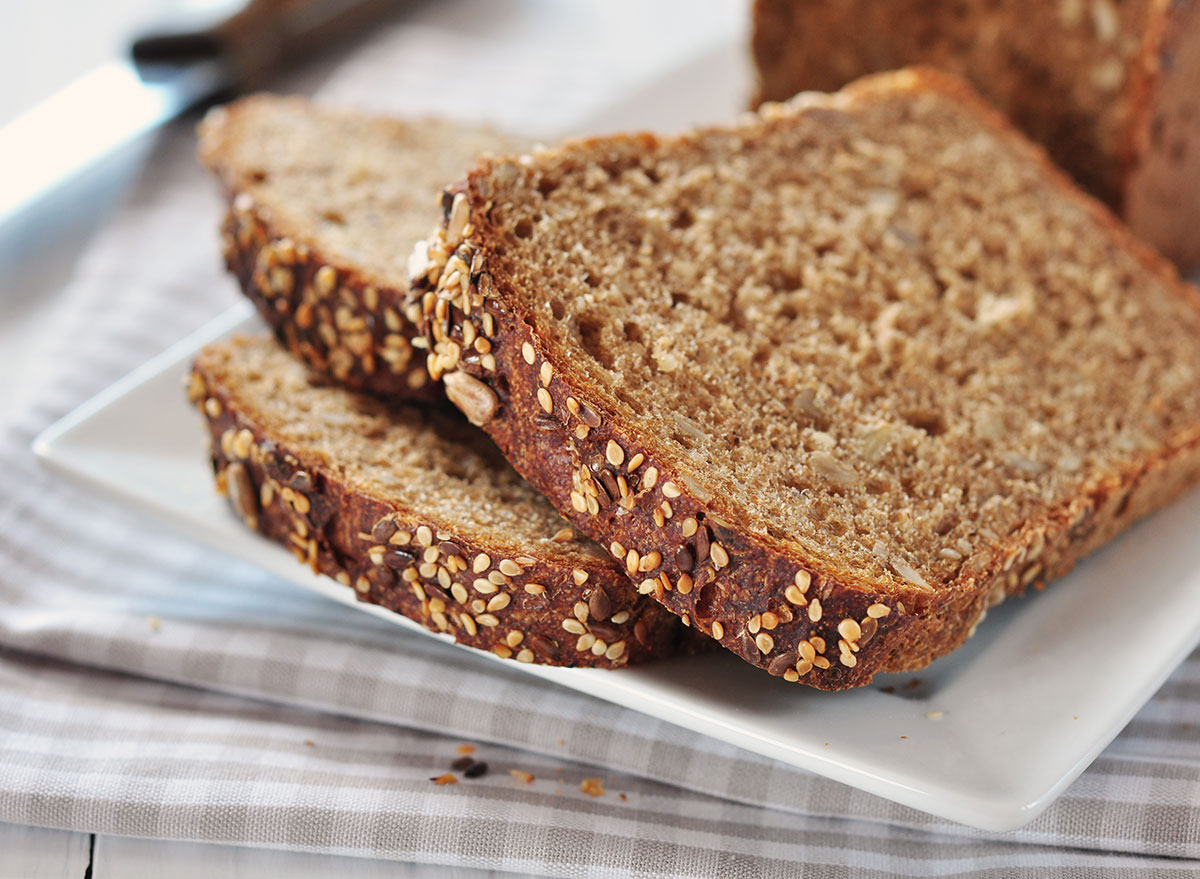Secret Effects of Eating Whole Wheat Bread, Says Science

Maybe you've been led to believe that eating bread is bad for you. You can blame the increasing popularity of low-carb diets, which tell you to significantly cut your carbs and a as result, significantly cuts your calories. Sure, eating anything in excess will cause you to gain weight—that's just science. But having a healthy amount of whole wheat bread in your diet can actually benefit you in many ways—even in some ways you've never even realized. The latest nutrition science shows us that having whole grains in our diets—like whole-wheat bread—will garner a few positive effects on our overall health.
The bread aisle in the grocery store is flooded with all kinds of options, including many "whole wheat" varieties. Although some of those whole wheat breads include a long list of chemicals and preservatives (and even high amounts of added sugars), there are other types of bread on the shelves that can still benefit your diet in many ways. The best type to go for is whole wheat bread that includes whole grains, which still have all of those good-for-you nutrients in every slice.
If you snag a whole wheat bread that includes whole grains, you will easily experience some of these secret effects. Here's why your body will love having whole wheat bread in your diet, and for even more healthy tips, be sure to check out our list of The 7 Healthiest Foods to Eat Right Now.
You'll get a boost in nutrients.

Instead of having the nutrients stripped during the production process, most whole wheat bread still contains the important nutrients that your body needs. Some of these include fiber, zinc, magnesium, protein, antioxidants, and a range of B vitamins as well. This range of nutrients can help with your digestion and can even help with preventing disease.
Specifically fiber.

Out of those many good-for-you nutrients in whole wheat bread, fiber is one of the most important. Depending on the type of bread, you'll likely get 3 grams of fiber per slice of whole wheat bread—which is around 12% of your daily recommended intake of 25 grams of fiber a day, according to the American Heart Association (AHA). Fiber is also vital when trying to lose weight, helps stabilize your blood sugar, and decreases your risk of developing diabetes or cardiovascular disease.
You'll lower your risk of disease.

As mentioned, eating foods high in fiber helps with decreasing your risk of disease by keeping your blood glucose levels stable and keeping your cells (and your gut) happy and healthy. But whole-wheat bread specifically has been shown in studies to help lower your risk of all kinds of disease. One study published by the British Medical Journal shows that whole-grain intake (like whole-wheat bread) is linked to reducing the risk of coronary heart disease, cardiovascular disease, respiratory diseases, infectious diseases, diabetes, cancer, and more.
You'll have a healthier gut.

This again is linked to the fiber in your whole grain bread, which is an essential nutrient for your gut health. The microbiota (the bacteria in your gut) actually feed on soluble fiber (found in whole wheat bread), which helps with reducing blood sugar levels and keeping your gut bacteria very happy. One review published in the journal Cell Host & Microbe was also able to show a clear link between dietary fiber intake and how it preserves the microbiota in your gut. Having a healthy gut is important for keeping your body healthy, especially your heart, your stomach, and your digestive tract.
Along with whole wheat bread, here's The Best Way to Eat for Your Microbiome and Improve Gut Health.
It can help lower inflammation.

White bread may be one of the more popular foods that cause inflammation, but surprisingly, whole wheat bread has the opposite effect. One randomized controlled study from Molecular Nutrition & Food Research shows how eating whole-grain foods has beneficial effects for systemic inflammation in children, and another study in the American Journal of Clinical Nutrition also links to a reduction in inflammation, which leads to a decreased risk of cardiovascular disease and diabetes.
Get even more healthy tips straight to your inbox by signing up for our newsletter! After, read these next:








